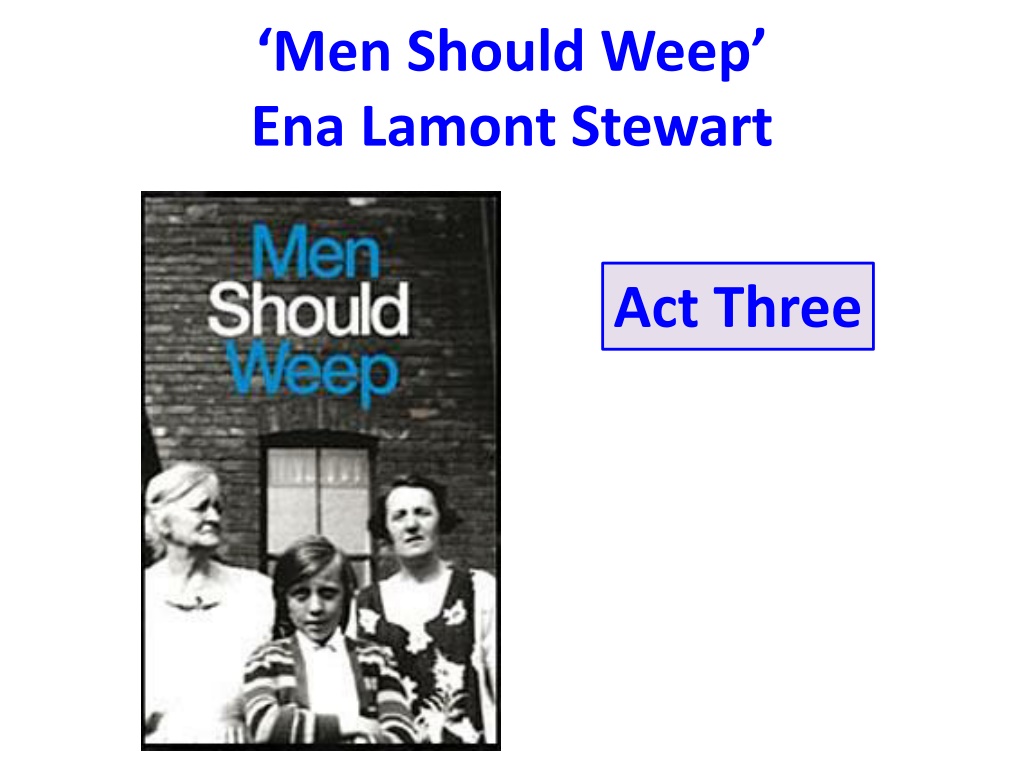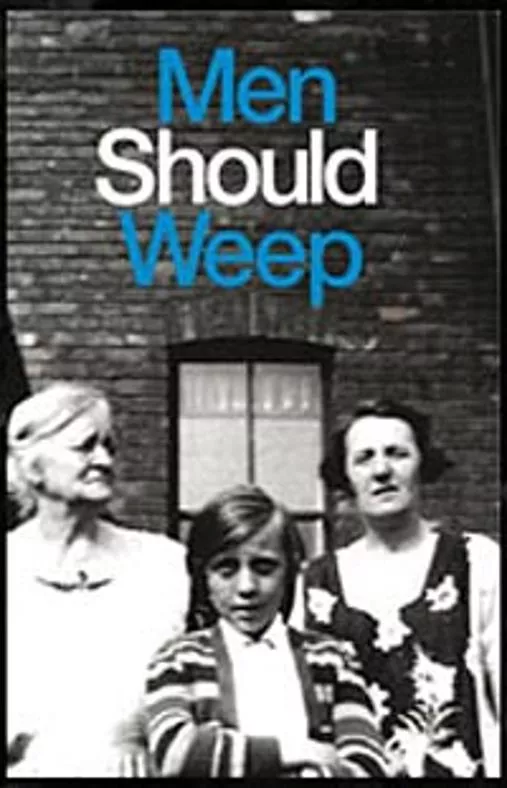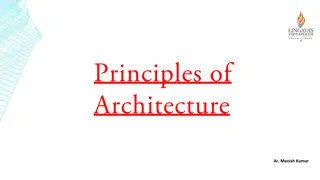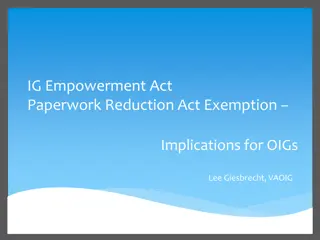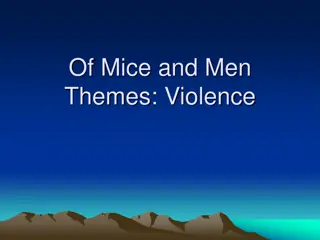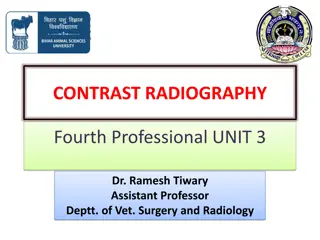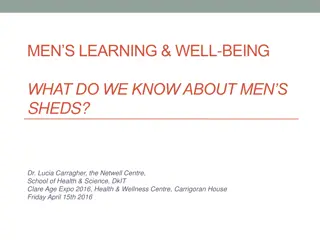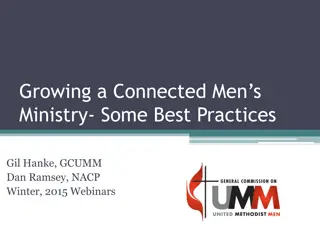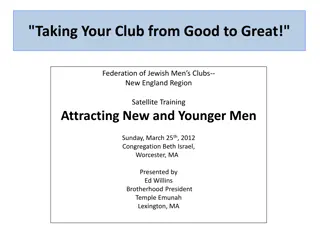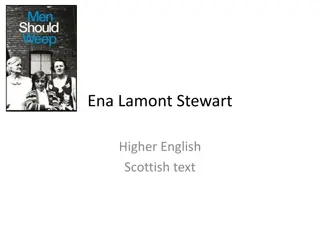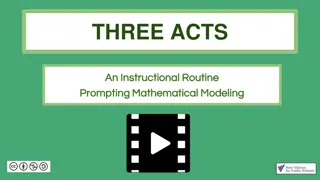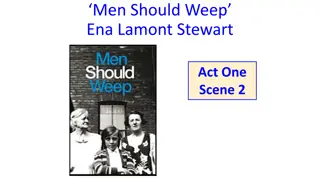Contrast and Development in "Men Should Weep" Act Three
Act Three of "Men Should Weep" by Ena Lamont Stewart portrays a contrast in atmosphere from the start of the act, characterized by a cheerier and more positive ambiance. It delves into complex family dynamics, plot strands, and character developments that culminate in a climactic resolution, offering a blend of hope and emotional intensity. The act revolves around significant events such as Isa's attempted departure, Jenny's return with newfound determination, and Maggie's assertion of control over her family's future.
Download Presentation

Please find below an Image/Link to download the presentation.
The content on the website is provided AS IS for your information and personal use only. It may not be sold, licensed, or shared on other websites without obtaining consent from the author.If you encounter any issues during the download, it is possible that the publisher has removed the file from their server.
You are allowed to download the files provided on this website for personal or commercial use, subject to the condition that they are used lawfully. All files are the property of their respective owners.
The content on the website is provided AS IS for your information and personal use only. It may not be sold, licensed, or shared on other websites without obtaining consent from the author.
E N D
Presentation Transcript
Men Should Weep Ena Lamont Stewart Act Three Introduction to the play
Act Three - Summary The scene opens in a cheery Morrison household prepared for Christmas. John arrives with a red hat, reminiscent of courting days, for Maggie, who is delighted. However, others criticise the gift, including the arriving neighbours. Lily arrives, shortly followed by Alec, who is looking for Isa. The mood darkens as he disrupts the atmosphere. There are mentions of Jenny, who seems not to be doing too well. Soon after the neighbours leave there is a time lapse. Isa is now packing her bags to leave without telling anyone. As she reaches the door, she meets Alec, who is hysterical and, realising her plans, attacks her. Isa, however, manipulates Alec and manages to escape with him hot on her heels. Maggie and Lily discover the evidence of the struggle.
Act Three - Summary Jenny returns looking like she's met with success but tells of how she nearly committed suicide. She has returned to try to get the family out of their dreadful living conditions so that Bertie can come home again (using money from a man she is living with). However, John arrives and wants nothing to do with her whore's winnins . Maggie counters this by bringing up their own early relationship to show John's hypocrisy. The scene, and play, ends on an emotional climax but with a note of hope: Maggie has taken command of the situation and sees a much brighter future.
In Act Three, two aspects are particularly significant: the contrast in atmosphere at the start of this act it is much lighter, happier and more positive the way the various plot strands and character developments come together to create the climax of the play.
Activity 1: Comparing the openings of Act One and Act Three You are going to analyse and compare the opening of Act Three and the opening of Act One, which you looked at previously. The sheet you have been given contains notes from the exercise which you did at the start of the play, when you looked at the ways in which the opening of Act One is significant in terms of: Setting Stage directions Plot Character development Thematic development You are going to repeat this activity for the opening of Act Three.
Possible Answers Setting Act One: Overcrowding, with no privacy and little comfort - established immediately with the description of the kitchen, with the bed recess, nappies drying over the fire, clutter and the presence of three generations living so closely together. Act Three: It is the same room, but transformed. Through the money from John s new job, not only is there a sense of festivity and prosperity decorations, vase of paper flowers but it is also clean, tidy , as if, suddenly, the chaos that went along with poverty has gone. We see Ernest with the much-desired football boots and radio his dreams fulfilled.
Possible Answers Stage Directions Act One: We first see Maggie hanging out of the window, shouting at the children outside, while also dealing with Granny s needs and then those of the children, behind the curtain. These attempts to assert some sort of control over the people she is responsible for are the pattern for Maggie s struggle throughout the play. The plight of Granny, infirm and homeless (if it were not for the care of the family who struggle to look after her), is shown in her sitting whining and rocking , setting up a terrible wail , while her sudden and random singing emphasises her confusion. Edie, though only eleven, is already taking on many family responsibilities. She is dressed in cast-off clothes, messy and skinny. We can see their impoverished diet: sugar and carbohydrate based, even for the baby. Maggie herself moves between various family needs, except when she sinks into a chair and sighs, then yawns widely : her exhaustion is clear.
Possible Answers Stage Directions Act Three: Ernest playing football, Granny smiling, Maggie polishing her few bits of brassware the kind of non-essential household task she now has time to do. John is smartly dresses, happy and confident : finally he has pride in himself as the provider. The red hat is, of course, symbolic: it is frivolous, not just functional , and similar to one Maggie had in her courtin days. By giving her this, he is trying to return to those early romantic times. Maggie s obvious pleasure shows how effective it is. When the neighbours arrive, instead of bread and jeely , they eat Christmas cake and chocolate biscuits.
Possible Answers Plot Act One: Maggie is trying simultaneously to get Granny to bed and her younger children in, fed and ready for bed. We learn that Granny has no home of her own but goes between Maggie and Lizzie, both daughters-in- law, and the Lizzie is reluctant to take her. Maggie clearly is struggling to deal with the various family needs and is in a muddle. She has not time for herself. A brisk knock announces the arrival of Lily. Act Three: It is Christmas Eve, John arrives home to take Ernest shopping for a ball (to go with the boots), having already bought Maggie the hat: she is his priority. Granny s criticism of the hat as nae a colour for an aul wife does not dampen the mood. The neighbours gather for convivial tea and cake. The symbolism of the hat is clear again: it prompts the neighbours to remember their days of happiness before marriage and poverty took it away.
Possible Answers Character Development Act One: Maggie s weary struggles are at the centre of this opening (as, indeed, of the whole play). Her impotent shouting at the children, her conversation with Granny (in which there is limited real communication) and her threats to Edie and Marina suggest an irritable person, but it is the difficulties in her life that make her so. We sense she is never finished and never quite accomplishes anything. She is exasperated and impatient with Granny and her humour can be cutting: Och, it s [Granny s life] been ebbin ever since I met ye; but the tide aye seems to come in again. Nonetheless, she shows kindness, agreeing to being Granny tea, with condensed milk, sugar and bread (although this is also a bribe to get her off to bed), and saying, John and me wad never send ye onywhere. Granny is pathetic, needy and manipulative. This suggests that the future for women such as her, when their children have grown up, is bleak and insecure.
Possible Answers Character Development Act Three: Like the setting, the characters are transformed. Maggie and John are celebratory, the warmth of their love finding a more overt and happy expression. The squabbling and complaining which is still going on is the kind found in normal families: Maggie and Ernest disagree about music; Granny complains about Ernest playing noisily. If the play ended here, it would seem they had all found their happy endings, but it does not. The mention of Alec and Isa clouds Maggie s happy face .
Possible Answers Thematic Development Act One: All of the above emphasises the difficulties of a life of poverty. We can see that the various characters are actually hungry in a way most of us today do not experience. In the domestic setting this poverty impacts particularly on women, whose life is portrayed as an endless struggle. (Only female characters have appeared so far.) As Maggie says, If a woman did everything that ought tae be done aboot the hoose, she d go on a day an a night till she drapped doon deid. Act Three: That a simple thing like a modest wage can bring such happiness is a social comment in itself. Of course, John s money will not solve the deeper issues, such as Bertie s illness and the family / marital breakup. And Maggie s heroism is still to be tested further
Activity 2: Creating the change of mood at the start of Act 3 Although Act 3 is not divided into scenes, it does have three obvious sections. The first section of Act 3 runs from the start of the act up to the point when Maggie and Lily go out shopping. Dramatically, this section represents a significant change of mood, both from the previous scene and from the darker sections to come in this act.
Activity 2: Creating the change of mood at the start of Act 3 Individually: 1. In what ways does the situation in the Morrison household seem much improved from the previous scene? 2. How does the playwright give this opening section of the act a much lighter mood? You should consider in some detail and with close reference to particular parts of this section such features as dialogue, use of humour, tone, characterisation, stage directions, physical action, topics of conversation, interplay between characters, etc. 3. How effectively does the playwright use the character of Alec in this opening section to darken the mood somewhat and to prepare the audience for the serious sections to follow in this act? Share your ideas in small groups Feedback to class
Activity 3: Alec and Isa The second section (p63 Black-out. Time lapse. - p66 Maggie and Lily come in ) shows us Isa s escape from Alec. In pairs: How is this section effective as a section of dramatic physical action and theatrical, rather than thematic, impact?
Activity 4: The climax of the play (p70 John comes in to end) We are going to examine the shift in power which takes place at the end of the play. The climax of the play involves Maggie taking control of the family s affairs, leaving John a rather broken and defeated figure.
Activity 4: The climax of the play (p70 John comes in to end) Individually - Questions to consider: 1. At the climax of the play what significant part does each of the women play in undermining John s position? You should look closely at key arguments and at the stage directions in answering this section. This scene is full of both subtle and dramatic shifts in the balance of power and you should attempt to trace these movements. 2. Contrast the presentation of Maggie and John at the very end of the act. By considering both dialogue and stage directions, you should assess the importance of the ending in understanding the play as a whole. Share your ideas in small groups Feedback to class
Activity 5: Overview of Act Three To establish an overview of this crucial act, can you put the key events which you have been given in the right order? A. Convivial, harmonious atmosphere with Maggie, Granny, Lily and the neighbours sharing chat and Christmas cake. B. Disrupted by arrival of Alec, who is rude and unpleasant and looking for Isa. C. Lily encourages Maggie to go shopping the first time we see Maggie do anything just for herself . D. Return of Isa, leading to a violent confrontation between her and Alec. E. Maggie returns to the scene of the fight and becomes upset. Lily is comforting. F. Jenny returns: revelation about Bertie, reconciliation with Maggie, and Lily s scornful commentary in the background. G. Arrival of John and confrontation with Jenny. H. Maggie asserts herself and humiliates John. I. Hopeful ending.
Activity 5: Overview of Act Three Some of these stages are longer than others. A, for example, is several pages long, but I is just a few lines. However, each is an important element in the climax of the play. In pairs: In order to familiarise yourself with the act s key moments and their significance, fill in the sheet you have been given with a quotation for each stage of the act. There are many possible quotations for each one. Share your ideas in groups.
Activity 6: the plays plot / character strands We are going to look in detail at the play s various plot / character strands: a) Alec and Isa s story of marital conflict b) Jenny s story the desire for independence c) Bertie s illness can he come home? (Note that Bertie never actually appears in the play, yet he is an important character. Consider why this is.) d) Maggie and John will he find work and will her struggles pay off? Although there are other stories in the play, such as what will happen to Granny, these four are the ones that have a definite progression towards an ending even if the ending is not dully resolved. They each have an impact of the play s eventual outcome.
Activity 6: the plays plot / character strands In pairs: examine the main plot strand which you have been allocated: briefly trace its progress through the play; in more detail, examine how it reaches a climax in Act Three. a) Alec and Isa s story of marital conflict b) Jenny s story the desire for independence c) Bertie s illness can he come home? (Note that Bertie never actually appears in the play, yet he is an important character. Consider why this is.) d) Maggie and John will he find work and will her struggles pay off?
Possible Answers: Maggie and John Act 1: Although they love each other, there are tensions related to John s lack of a job and their resulting poverty. John resents the interference and criticism of Lily and is not keen on allowing Alec and Isa to move in (unlike Maggie). Maggie attempts to hide from John the fact that Jenny is out late, but cannot prevent his outburst when Jenny arrives. Act 2: As things fall apart, John and Maggie continue to struggle to support each other. The loss of Jenny and Bertie leaves Maggie distraught and John full of self-accusation and despair. John allows himself to be drawn into flirting with Isa and laughing at Maggie and Alec behind Maggie s back. He is ashamed when Maggie returns, exhausted and starving. Maggie loses control when John sides with Isa and he comforts her with tenderness.
Possible Answers: Maggie and John Act 3: The act begins on a positive, harmonious and happy note. John, now employed, has regained his self-respect and takes delight in giving Maggie the red hat for Christmas. He arrives home (from shopping) to find Jenny urging Maggie to accept the money she has saved to rent a proper, healthy house for Bertie to come home to. John refuses to accept Jenny s whore s winnins , shocking Maggie with this course and hateful expression. It is not his pride (he would gladly have taken the money if she had earned it respectably ) but the shame of her living in sin and taking money from her lover.
Possible Answers: Maggie and John Act 3: Faced with the choice between reconciliation with Jenny and Bertie s return or supporting John (as he has done throughout the play) Maggie asserts herself and takes the money. She exposes John s hypocrisy in condemning Jenny by revealing intimate details of their pre-marital relationship ( Whit wis I, when we were coortin, but your tart? ). She humiliates him by accusing him of lusting after Isa ( the way ye looked at yer ain son s wife trailing aboot the hoose wi her breasts fa in oot o her fancy claes ) and, in a chilling moment, reminding of his furtive, desperate seduction of her years before ( Maggie! Come on, quick, ben the back room lock the door it ll no tak minutes ). She immediately regrets exposing their private life in this way ( There s things atween husbands an wives shouldna be spoke aboot ) while John, ashamed of himself, allows Jenny to take his hand. A traumatic but hopeful moments, as Maggie hopes There ll be flowers come the spring! )
Activity 7: Set text practise These analysis questions are based on a section of Act 3 (from Maggie: Whit aboot Jenny? p61 to Lily: Come oan! p63). 1. Look at the opening lines of this section from Maggie: Aye. She paid for the dressin to whit wey they turn oot. Analyse how language is used to show the contrasting attitudes of Maggie and Lily towards Jenny. 4 2. The neighbours discuss their husbands. Identify the contrast between the way they talk about marriage and the way they behave towards their husbands. 2 3. Much of this section involves Maggie and Lily talking to, or about, Granny. By referring to the dialogue and / or stage directions in this section, explain Granny s own attitudes to life and the attitudes Maggie and Lily demonstrate towards her. 4 4. By referring to this section and elsewhere in the play, discuss how the relationship between Maggie and Lily is developed. 10
A reminder about the final question The final question is worth 10 marks at Higher. Marks are likely to be picked up in 5 pairs of 2. Answers can be extended bullet points (recommended) or formal continuous prose. You can pick up a maximum of 4 marks by dealing with the extract printed on the exam paper. The other 6 marks must come by way of reference to elsewhere in the play.
Example of how to answer the final question Q: By referring to this section and elsewhere in the play, discuss how the relationship between Maggie and Lily is developed. 10 1. Identification of commonality in this extract and at least one other part of the play = 2 marks 2. Pick another aspect from the printed extract and comment on how this shows how their relationship is developed. Quote + comment = 2 marks 3. The remaining 6 marks are most likely to be picked up in three pairs of two marks. All examples and references must come from other parts of the play i.e. parts that are not printed in the exam paper. Relevant reference to technique / idea / feature of another part of the playthat shows how Maggie and Lily s relationship is developed = 1 mark Appropriate explanation of how this example shows the development of their relationship = 1 mark 4. Repeat this process 3 times for all 6 marks
Possible Answers 1. Look at the opening lines of this section from Maggie: Aye. She paid for the dressin to whit wey they turn oot. Analyse how language is used to show the contrasting attitudes of Maggie and Lily towards Jenny. 4 Maggie: admiring towards Jenny, longing for her: Whiles I dream about her pop in on me. Attempting to sound light and less distraught: pop in. Depth of her love for Jenny expressed in: Once they ve been laid turn oot . The physical and lifelong connection between mother and child is emphasised. Lily: matter-of-fact, unsentimental: She said she wouldnae come back no comin back. Repetition of sentence structure hammers home certainty that she will not return.
Possible Answers 1. Look at the opening lines of this section from Maggie: Aye. She paid for the dressin to whit wey they turn oot. Analyse how language is used to show the contrasting attitudes of Maggie and Lily towards Jenny. 4 2 marks for a detailed / insightful comment plus a quotation / reference. 1 mark for a more basic comment plus a quotation / reference. 0 marks for a quotation with no comment. Total 4 marks. (Marks can be gained 2+2, 2+1+1 or 1+1+1+1)
Possible Answers 2. The neighbours discuss their husbands. Identify the contrast between the way they talk about marriage and the way they behave towards their husbands. 2 The women speak scornfully and dismissively about their husbands (1 mark) But still do as they are told / husbands are still in charge (1 mark) Total: 2 marks
Possible Answers 3. Much of this section involves Maggie and Lily talking to, or about, Granny. By referring to the dialogue and / or stage directions in this section, explain Granny s own attitudes to life and the attitudes Maggie and Lily demonstrate towards her. 4 Granny: has no control over her own life / cannot make decisions about even basic things like when she goes to bed / her only way of asserting herself is to complain constantly and impotently / knows they are up to something . Plus quotation / reference Maggie and Lily: good-humoured (and in Maggie s case, warm) but no-nonsense control of Granny. She is put to bed, out of the way, when her presence is inconvenient. They treat her like a child, offering sweets, etc. Plus quotation / reference
Possible Answers 3. Much of this section involves Maggie and Lily talking to, or about, Granny. By referring to the dialogue and / or stage directions in this section, explain Granny s own attitudes to life and the attitudes Maggie and Lily demonstrate towards her. 4 2 marks for a detailed / insightful comment plus a quotation / reference. 1 mark for a more basic comment plus a quotation / reference. 0 marks for a quotation with no comment. Total 4 marks. (Marks can be gained 2+2, 2+1+1 or 1+1+1+1)
Possible Answers 4. By referring to this section and elsewhere in the play, discuss how the relationship between Maggie and Lily is developed. 10 Up to 2 marks for a general explanation of Maggie and Lily s relationship in the play (commonality). For example: Explanation of how Lily and Maggie s relationship develops: although they differ and disagree, they do have a close bond. Lily genuinely wants the best for Maggie, who does appreciate her help. They move from Lily criticising Maggie to admiring / supporting her at the end.
Possible Answers 4. By referring to this section and elsewhere in the play, discuss how the relationship between Maggie and Lily is developed. 10 Up to 2 marks for comments on this section. For example: Lily does not understand Maggie s need to believe that Jenny will return and cannot grasp the depth of emotion between mother and child; Lily urges Maggie to go shopping / to enjoy something for herself ; Maggie thanks Lily for constant help with family; Lily comes close to telling Maggie she loves her.
Possible Answers 4. By referring to this section and elsewhere in the play, discuss how the relationship between Maggie and Lily is developed. 10 3 x 2 marks for comments and references from elsewhere in the play, of which there are many. Here are some examples: Lily is irritated by Maggie s inability to sort out the muddle of the family s life refer to Act 1. Nonetheless, she offers Maggie practical help, for example the tin of beans (and many other similar gifts). Lily does not (immediately) tell Maggie that Alec owed her money she tries to protect her from this upsetting news. TOTAL: 10 marks
Activity 8 Act Three Quiz 1. How have things changed for the Morrisons? 2. What kind of music is Ernest listening to? 3. What is Maggie s mood at the opening of this Act? 4. What is the significance of John s Christmas present to Maggie? 5. List all the Christmas gifts that each member of the Morrison family is to receive, now that John has a job. 6. What is John s new employment? 7. What team does Ernest support? 8. Explain the comic elements of this scene. 9. What was The La Scala ? 10. Who is a reformed alcoholic?
Activity 8 Act Three Quiz 11. What does Lily think about Maggie s new hat? 12. What present does Lily give Maggie? 13. What was the Sanny ? 14. What is Alec s mood in this scene? 15. How does Alec s mood change? 16. How long is it since Jenny walked out on her parents? 17. What is Mrs Bone s marriage like? 18. Why is Alec upset with Isa? 19. What is it about Alec that disgusts Isa? 20. How does Alec feel about Isa?
Activity 8 Act Three Quiz 21. Why does Lily put Alec s knife in her handbag? 22. Why does Maggie believe that she is being punished? 23. How does Maggie feel about Lily in this scene? 24. How does Maggie feel about Jenny s return? 25. What has happened to Jenny since she left home? 26. What is a sugar-daddy ? 27. What is Maggie s attitude with regards to hospitals? 28. What was the Corporation ? 29. Why does Jenny feel guilty? 30. What does Lily think about Jenny s new relationships?
Activity 8 Act Three Quiz 31. What prevents John from showing any sign of reconciliation with Jenny? 32. Why will the officials at the hospital not let Bertie return to the Morrisons flat? 33. Why does John refuse to take Jenny s money? 34. What is the significance of Maggie accepting Jenny s money? 35. How do Maggie s words humiliate John? 36. Does the future look bright for the Morrison family? 37. What genre of play is Men Should Weep ? 38. Is this play relevant to a modern day audience? Why? / Why not?
